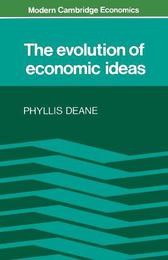
|
The Evolution of Economic Ideas
Paperback / softback
Main Details
| Title |
The Evolution of Economic Ideas
|
| Authors and Contributors |
By (author) Phyllis Deane
|
| Series | Modern Cambridge Economics Series |
|---|
| Physical Properties |
| Format:Paperback / softback | | Pages:256 | | Dimensions(mm): Height 216,Width 140 |
|
| Category/Genre | Economics |
|---|
| ISBN/Barcode |
9780521293150
|
| Classifications | Dewey:330.1 |
|---|
| Audience | | Tertiary Education (US: College) | | Professional & Vocational | |
|---|
| Illustrations |
Worked examples or Exercises
|
|
Publishing Details |
| Publisher |
Cambridge University Press
|
| Imprint |
Cambridge University Press
|
| Publication Date |
5 October 1978 |
| Publication Country |
United Kingdom
|
Description
The failure of orthodox economic analysis to provide acceptable answers to the dominant contemporary policy problems has given rise to a widespread feeling of 'methodological crisis' in the discipline. Students find it increasingly hard to relate to a textbook-authenticated paradigm which seems to be in the process of disintegration. The object of this book is to put some of the current theoretical controversies into long term perspective by tracing their historical antecedents. A connected object is to interpret some of the doctrinal divisions in the modern debate by showing that they spring from profound disagreements about what economics is and what questions the economist ought to be trying to answer. It examines the way leading theorists have adapted their theories and concepts to major changes in the problem-situation facing policy makers. The book is in no sense exhaustive (either in the range of theories or in the selection of theorists discussed) but focuses particularly on changes in economists' views on the scope and methodology of economics and on the evolution of strategic ideas in the fields of value theory, monetary theory and growth theory. It raises questions of a socio-historical kind, such as: when did economics acquire a sufficently coherent and well-attested paradigm to rank as a distinct discipline? What were the distinguishing characteristics of successive paradigms for economics? How revolutionary were the changes attributable to periods of significant theoretical change? How can we explain the success or failure of alternative paradigms in gaining a hold over the minds of a majority of professional economists? All economists will find valuable insights in this book. For undergraduate students it is a compact and readable introduction to the history of economic thought.
|